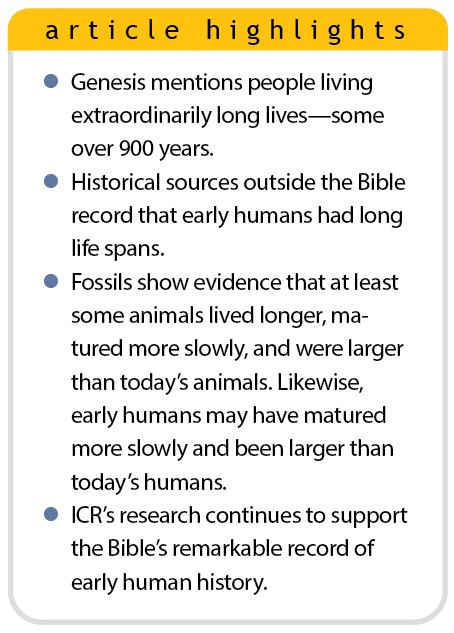 Both before and after the Flood, the Bible attests that centuries-long life spans were normal. Skeptics scoff at these great ages, and even some Christians say we simply cannot take them at face value.1 Is there evidence for this extreme longevity?
Both before and after the Flood, the Bible attests that centuries-long life spans were normal. Skeptics scoff at these great ages, and even some Christians say we simply cannot take them at face value.1 Is there evidence for this extreme longevity?
Because it is the Word of God, the Bible’s own testimony carries the greatest possible weight. There’s also extrabiblical evidence that some longer life spans were real. The Jewish historian Josephus and Christian theologian Augustine of Hippo both affirmed that early humans had enormous life spans.2
Moreover, Josephus listed a dozen authors of ancient history who recorded great longevity for humans, including the Egyptian historian Manetho, the Babylonian historian Berosus, and the Greek poet Hesiod. Although their works containing this information have apparently been lost, the fact that Josephus cited them shows that knowledge of extended life spans was widespread in the ancient world.
Augustine not only affirmed that people before the Flood (antediluvians) lived to great ages but also that they were larger than we are.
...observed how prolonged were the lives of men, unless some skeptic take exception to this very length of years which our authors ascribe to the antediluvians and deny that this is credible. And so, too, they do not believe the size of men’s bodies was larger than now.2
Indeed, cultures from around the world affirm that antediluvian people lived longer and were possibly bigger than people today. As part of my current research, I am in the process of compiling a list of these traditions. Although not all creation scientists agree that early humans were larger than humans today, hints in the Bible and fossil record lend plausibility to that scenario.

Additionally, some evidence indicates that slower rates of maturation are associated with longer lives and larger body sizes. The earliest age at which a Genesis 5 patriarch is listed as having a son is 65. While we don’t know for certain, it seems likely that at least some of the sons listed in the Bible’s early genealogies were firstborn.
So, were antediluvians undergoing puberty in their teenage years but deciding to wait 50+ years to have children? That seems extremely unrealistic. Another explanation needing consideration is that it took much longer for antediluvians to become mature compared to humans today.
Years ago, creation researchers Don Patten and Greg Beasley deduced that great longevity should be associated with larger body sizes and delayed maturation.2,3 Fossil animals and plants are generally larger than their counterparts today. This is true not just for extinct giants like the dinosaurs but for extant creatures such as oysters, camels, kangaroos, and penguins.
Scientific literature includes evidence that at least some fossil creatures were larger, took longer to mature, and lived longer than their present-day descendants.4 Given this linkage between body size, longevity, and rate of maturation, it’s possible this was also generally true for pre-Flood and immediate post-Flood people, animals, and plants.5
It’s no surprise that ICR’s new research tends to confirm the accuracy of the Genesis record as plainly understood since it is the testimony of the Creator Himself, the Lord Jesus Christ.6 As our late president Dr. John Morris loved to say, “It’s a great time to be a Bible-believing Christian!”
References
- Did the Patriarchs Live 900+ Years? Craig Olson interview with Sean McDowell. YouTube. Posted on youtube.com, accessed October 19, 2023.
- Patten, D. W. 1982. The longevity accounts in ancient history. Creation Research Society Quarterly. 19 (1): 40–52.
- Beasley, G. 1990. Pre-Flood Giantism: A Key to the Interpretation of Fossil Hominids and Hominoids. Journal of Creation. 4 (1): 5–55.
- Hebert, J. ICR Research Is Revealing Evidence for Pre-Flood Longevity. Creation Science Update. Posted on ICR.org October 30, 2023.
- For instance, a Denisovan molar was so large it was at first mistaken for a cave bear tooth. Lewis, D. DNA from a Huge Tooth Confirms a New Ancient Cousin. Smithsonian. Posted on smithsonianmag.com November 17, 2015, accessed November 14, 2023.
- Morris, H. M. 2016. Did Jesus Teach Recent Creation? Acts & Facts. 45 (7): 5–7.
* Dr. Hebert is Research Scientist at the Institute for Creation Research and earned his Ph.D. in physics from the University of Texas at Dallas.













